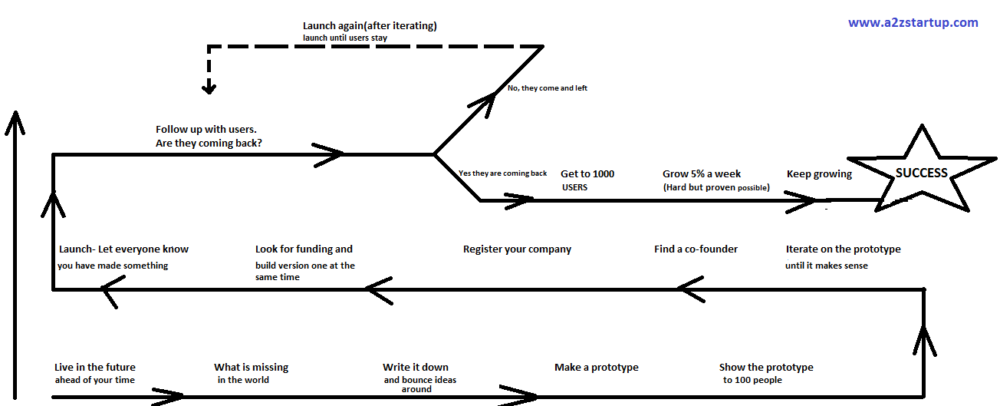Business Strategies
Startup business has no hard and fast rule but generally there is a need for three things to create a successful startup: to start with good people, to make something customers actually want, and to spend as little money as possible. Most startups that fail do it because they fail at one of these. A startup that does all three will probably succeed.
Would like to quote here Mr. Ratan Tata’s statement about how an entrepreneur decides his business strategies “There is no formula for it but I will pick up an example. Leadership, also entrepreneurship, comes from and runs all the way down to your soul. When terrorists attacked the Taj Hotel, we had more than 300 guests staying at the hotel, people were eating at the restaurant, sitting in the lobby and working. Terrorists opened fire in a moment and started killing innocent people. In that moment, there was no manual that told the staff what to do. The staff turned off the lights, closed the doors, made people lie on the floor and helped as many as possible escape from danger or death. They lost their lives but saved many. Harvard has written cases about what made the hotel staff do that and risk their own lives. It wasn’t taught, there was no planning or strategy there wasn’t a simulated action to guide them but they turned out to be the real heroes, the real leaders of the evening. Leadership is something that can’t be replicated as is. It comes from within. When crisis takes place, a true leader knows what to do.”
A great way for early stage companies to grow quickly is by doing partnership deals to expand the core business line or to develop entirely new business lines– what we refer to as startup business development. Such deals are strategic in nature, and are used to generate “inorganic” or indirect revenue growth. Examples include:
— Co-Marketing / PR deals to gain exposure for your product / service
— Distribution deals to get your product / service in front of more potential users (including publisher, content syndication, and affiliate deals)
— API deals to get in front of more potential users, or to bring additional functionality into your product
— Platform deals to get application developers to develop for your platform
— Content acquisition deals
— Channel and reseller deals
As per Mr. Nathan Beckord (startup consultant) Business development is both creative and analytical—left brain and right brain—and done well, business development deals can be the purest representation of the equation “1+1=3” to drive growth.
He has also shared a few tips for startups doing deals:
- Focus on the right targets.
- Come to the table from a position of strength.
- Get creative.
- ”Ask not what your partner can do for you–ask what you can do for your partner.”
- Introduce competition into every deal.
- Be operationally ready to do a deal.
- Know when to cut bait and run.
As per Mr. Alexander Taub (author at Forbes) Business Development and partnerships consists of three main things:
The first is the process of marketing, selling, and developing strategies for your company.
The second facet of the role is to strengthen ties with existing partners and to create new ones, which helps build, grow, and maintain your network.
The third, and probably most important, is getting to the point of transaction and turning it into repeat occurrences. Every startup is looking to find a way to build a scalable business. In BD and partnerships, you should be looking for that moment of transaction and trying to repeat it as many times as possible.
He further said that there are three types of partnerships.
The first is product partnerships, also known as integration partnerships. This is typically when one company integrates another company’s product. An example of this would be something like crowdfunding charity website, HopeMob, integrating Dwolla’s payment API to accept donations
The second is brand partnerships, also known as co-branded partnerships. This is typically when two brands come to together to do big things together.
The last is a distribution partnership, also known as a network partnership. This type of partnership happens when one side promotes the other to their userbase.
There are a few different types of business development. Phrases like B2C, B2B, B2D, B2B2C, are thrown around constantly. What do they mean?
Business To Consumer (B2C) – B2C refers to consumer-facing companies. Companies like Facebook, Twitter, Foursquare, Instagram, and Tumblr come to mind.
Business To Business (B2B)- B2B is when you are a business selling to other businesses. Companies like Salesforce, Box, and 37 Signals are good examples.
Business To Business To Consumer (B2B2C) or Business To Developer (B2D)- B2B2C or B2D typically is when a company “powers” a feature on a third-party website. They typically need to sell the product team or a developer of the company. Some people call it the “powered by” solution.
Startup business strategy is tricky and there is no fixed framework to apply, it depends on individual’s time, intelligence and understanding, but to summarize the whole process from start to success, I’m sharing this below diagram:



